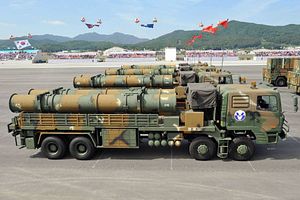Following North Korea’s recent missile tests, South Korea has reportedly successfully test launched a new ballistic missile with an estimated range of 800 kilometers, according to South Korean media reports.
“There was a test firing recently of a Hyunmoo-type ballistic missile with a range of 800km at the Anheung test site of the Agency for Defense Development (ADD) under the wing of the Defense Ministry,” an informed source told Yonhap News agency on April 6. “It’s assessed that it was successful.”
The test site is located near the coastal city of Taean, in South Korea’s South Chungcheong Province. The Republic of Korea Ministry of Defense refused to publicly comment on the test citing operational security. According to the source, Defense Minister Han Min-koo personally observed the test launch.
The missile reportedly hit its target, although the ADD shortened the missile’s flight range. The source also noted that this was not the first test of the missile, indicating that its development is at an advanced stage.
The South Korean military intends to field the new ballistic by the end of the year. Judging from the missile’s range, it appears that the missile tested was an improved variant of the Hyunmoo (현무, which literally means “Guardian of the Northern Sky”) missile family.
The Republic of Korea Armed Forces currently operate two variants of the Hyunmoo missile, the Hyunmoo 2A and 2B ballistic missiles, both surface-to-surface missiles with an estimated maximum range of 300 kilometers and 500 kilometers (310 miles) respectively. Both weapon systems are capable of carrying a payload of up of up to 997 kilograms (2,200 pounds). The new 800-kilometer missile will likely be designated Hyunmoo 2c.
I first reported about the South Korean military’s intention to test fire a new ballistic missile in response to North Korea’s missile tests this February. “There is also an opinion in the military that it will be more effective to unveil the test-firing scene of a new 800 km ballistic missile, which is in the final stage of development,” an ADD source said at that time.
As I explained elsewhere (See: “South Korea Tests New Ballistic Missile”):
Ever since 2012, Seoul has been developing a new ballistic missile after the United States and South Korea concluded an agreement to extend the range of those weapons by up to 800 kilometers (about 500 miles) and carry warheads heavier than the pre-2012 limit of 500kg (1,102 pounds).
However, the agreement stipulates that the payload of missiles with a 500-mile range is limited to 1,100 pounds or below, in order to avoid a regional missile arms race with South Korea’s neighbors – China and Japan (shorter range ballistic missiles can carry up to 4,400 pounds under the rules).
The new 800-kilometer variant of the Hyunmoo would put South Korean missile launchers out of range of North Korean missiles. South Korea has also been working on a new submarine-launched ballistic missile, specifically designed for the Republic of Korea Navy KSS-III (aka Jangbogo III)-class diesel-electric attack submarines (See: “South Korea to Develop Submarine Launched Ballistic Missile”). Furthermore, I noted:
Ballistic and cruise missiles (e.g, the Hyunmoo 3B and 3C surface-to-surface cruise missiles, with an estimated range of 1,000 and 1,500 kilometers respectively) play a pivotal role in South Korea’s deterrence strategy, known as the Korea Massive Punishment & Retaliation (KMPR)(…).
In the event of a North Korean nuclear attack (or even signs of preparations for one), KMPR specifically calls for surgical strikes against key leadership figures of the communist regime and military infrastructure with the missiles part of a so-called kill chain consisting of integrated information, surveillance, and strike systems, as well as the Korea Air and Missile Defense (KAMD) system.
The recently compromised OPLAN 5015, a classified US-ROK war plan for conflict on the Korean Peninsula, is part of KMPR.

































